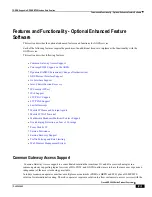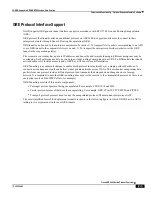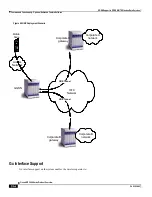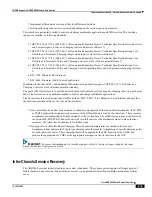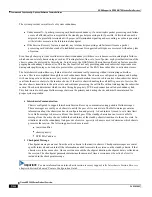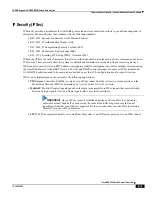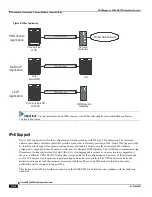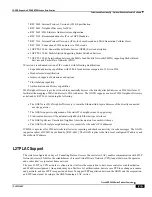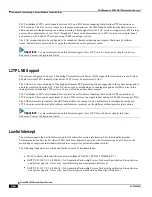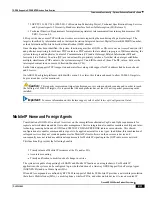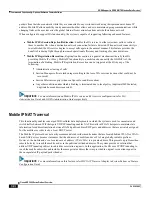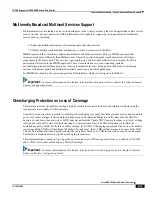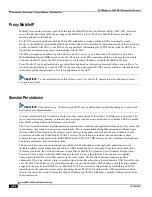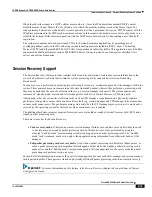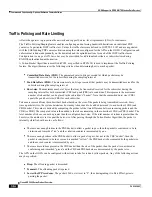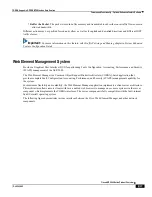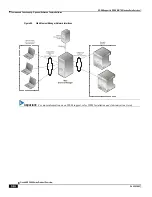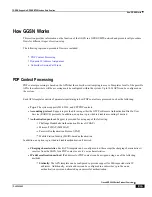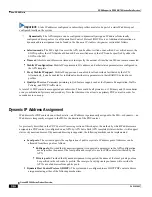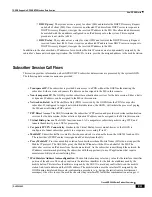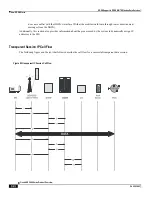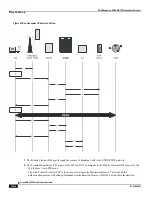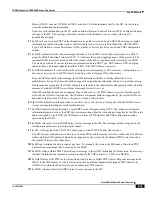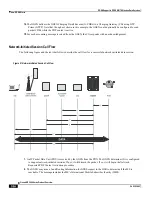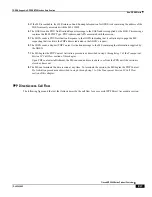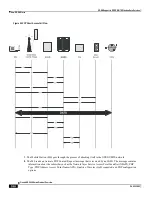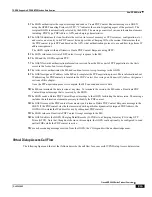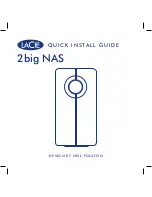
GGSN Support in GPRS/UMTS Wireless Data Services
▀ Features and Functionality - Optional Enhanced Feature Software
▄ Cisco ASR 5000 Series Product Overview
OL-22938-02
Proxy Mobile IP
Mobility for subscriber sessions is provided through the Mobile IP protocol as defined in RFCs 2002-2005. However,
some older Mobile Nodes (MNs) do not support the Mobile IP protocol. The Proxy Mobile IP feature provides a
mobility solution for these MNs.
For IP PDP contexts using Proxy Mobile IP, the MN establishes a session with the GGSN as it normally would.
However, the GGSN/FA performs Mobile IP operations with an HA (identified by information stored in the subscriber's
profile) on behalf of the MN (i.e. the MN is only responsible for maintaining the IP PDP context with the GGSN, no
Agent Advertisement messages are communicated with the MN).
The MN is assigned an IP address by either the HA, an AAA server, or on a static-basis. The address is stored in a
Mobile Binding Record (MBR) stored on the HA. Therefore, as the MN roams through the service provider's network,
each time a hand-off occurs, the MN will continue to use the same IP address stored in the MBR on the HA.
Proxy Mobile IP can be performed on a per-subscriber basis based on information contained in their user profile, or for
all subscribers facilitated by a specific APN. In the case of non-transparent IP PDP contexts, attributes returned from the
subscriber's profile take precedence over the configuration of the APN.
Important:
For more information on this feature, refer
Proxy Mobile IP
chapter in
System Enhanced Feature
Configuration Guide
.
Session Persistence
Important:
Other licenses (i.e. IP Security and L2TP) may be additionally required depending on your network
deployment and implementation.
Provides seamless mobility to mobile subscribers as they roam between WiLAN and 3G cellular access networks. This
type of inter-technology roaming is ordinarily not possible as wireline access networks do not include SGSNs to permit
inter-SGSN call hand-offs with cellular access networks.
The Cisco Session Persistence Solution maintains consistent user identities and application transparency for your mobile
subscribers as they roam across bearer access networks. This is accomplished through the integration of Home Agent
(HA) and GGSN functionality on the wireless access gateway in the packet network and the use of standards-based
protocols such as Mobile IP and Mobile IP NAT Traversal. The solution also includes Session Persistence client
software that runs on dual-mode WiFi/GPRS/EDGE and/or UMTS/W-CDMA access devices including cellular phones
and laptop computers with wireless data cards.
The Session Persistence client is designed to permit Mobile IP tunneling over the applicable underlying network
including cellular access connections and cable or XDSL broadband access networks. When the user is attached to a
WiFi access network, the Session Persistence client utilizes a Mobile IP Co-located Care of Address Foreign Agent
Service (CCoA FA) and establishes a MIP tunnel to the HA service in the platform. This scenario is completely
transparent to the GGSN service that operates in the same system. The Mobile IP protocol requires a publicly
addressable FA service; however, this is a problem when the mobile subscriber is located behind a NAT firewall. In this
case, the NAT firewall has no way of maintaining state to associate the public NATed address with the private address
assigned to the user by local DHCP server. Mobile IP NAT Traversal solves this problem by establishing a UDP/IP
tunnel between the subscriber access device and Home Agent. The NAT firewall uses the UDP port address to build
state for the subscriber session. During this Mobile IP transaction, the HA establishes a mobility binding record for the
subscriber session.
Summary of Contents for ASR 5000 Series
Page 1: ......
Page 26: ......
Page 48: ...New In Release 10 0 SCM Features Cisco ASR 5000 Series Product Overview OL 22938 02 ...
Page 50: ......
Page 58: ......
Page 68: ......
Page 126: ......
Page 138: ......
Page 146: ......
Page 218: ......
Page 236: ......
Page 356: ......
Page 374: ......
Page 422: ......
Page 496: ......
Page 572: ......
Page 654: ......
Page 700: ......
Page 726: ......
Page 784: ......
Page 816: ......
Page 844: ......
Page 906: ......
Page 926: ......
Page 942: ......
Page 943: ...Cisco ASR 5000 Series Product Overview OL 22938 02 Chapter 30 Technical Specifications ...
Page 966: ......
Page 972: ......


